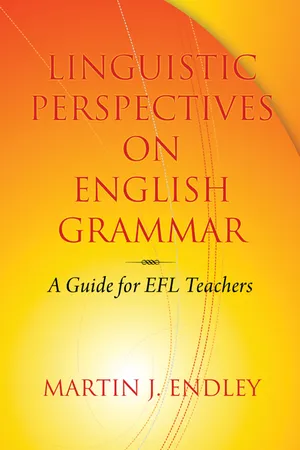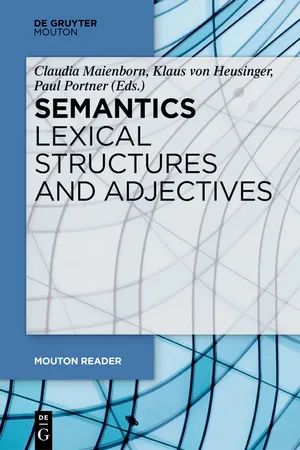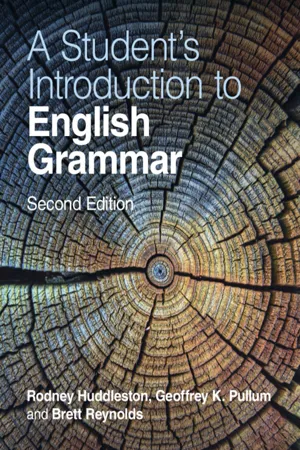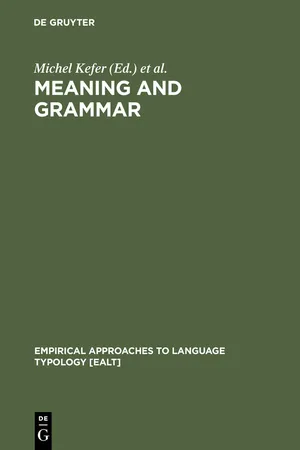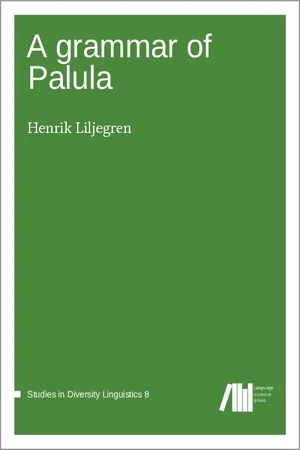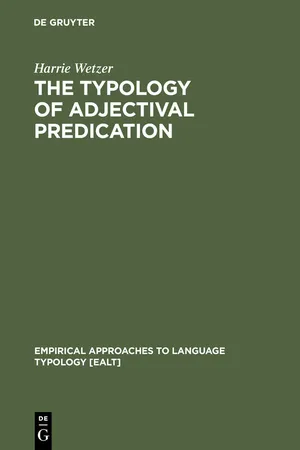Languages & Linguistics
Adjective
An adjective is a word that describes or modifies a noun or pronoun by providing more information about its qualities, characteristics, or attributes. In language, adjectives can indicate size, color, shape, age, and more. They play a crucial role in adding detail and specificity to the nouns they modify.
Written by Perlego with AI-assistance
Related key terms
1 of 5
8 Key excerpts on "Adjective"
- eBook - PDF
- Martin J. Endley(Author)
- 2007(Publication Date)
- Information Age Publishing(Publisher)
Additionally, I will briefly touch upon two further potential difficulties in relation to ad- jectives, namely participles and compound forms. After this, I will turn to adverbs, limiting my discussion to two main issues: first, the similarities and differences between Adjectives and adverbs; and second, the functions per- formed by adverbial expressions. The Adjective Word Class: Morphosyntactic Characteristics In some languages, the Adjective class is a small, closed class. And some lan- guages lack such a class entirely, with the meanings expressed by Adjectives in English being expressed by other syntactic categories. However, modern Adjectives and Adverbs in Linguistic Perspective 79 English has a rich range of Adjectives and they are ubiquitous in the speech and writing of EUEs. Like nouns and verbs, Adjectives belong in the open class of words in English and it is not uncommon for new Adjectives to be added to the language. What, then, is an Adjective? Students are often taught that an Adjective is a word that “describes” or modifies a noun. This is a reasonable start- ing point, insofar as many Adjectives are found in close association with nouns, but, once again, there is a great deal more that needs to be said. In fact, as we will see shortly, only some Adjectives are modifiers. Others are better understood as complements. The use of such labels is not always a straightforward matter. For our purposes, we can say that a modifier is an optional element; on the other hand, a complement is grammatically required. The Position of Adjectives: The Prenominal Position In English, there are two main positions that an Adjective may occupy in a construction. One position is within a noun phrase, immediately pre- ceding the noun. I will follow the conventional designations, referring to Adjectives in the prenominal position as attributive Adjectives, and Adjectives in post-verbal position as predicative Adjectives. - Frede Jensen(Author)
- 2012(Publication Date)
- De Gruyter(Publisher)
II. The Adjective Adjectives and the Noun Category 121. While nouns have only one gender, being either masculine or fe-minine, Adjectives depend grammatically on the noun to which they are joined and with which they show agreement in gender, case and number. As predicates they may appear in neuter form in old French: an im-personal est ban 'it is good' vs. a personal est bons 'he is good'. Adjectives fall into two major groups: qualifying Adjectives and determiners, the for-mer expressing a quality, the latter a determination which can be posses-sive, demonstrative, relative, interrogative or indefinite, or which may re-late to numbers. The present chapter deals only with the qualifying cate-gory of Adjectives, while determiners are treated together with the corre-sponding pronoun forms. The Adjective has two major functions in the sentence: an attributive and a predicative function. It is attributive when joined directly to the noun as in // riches hons 'the rich man'; les bestes sauvages 'the wild animals', predicative when the linking is assured by means of a verb as in l'espee fu legiere et bone (Queste 94.25) 'the sword was light and good'; granz est la joie (ibid., 4.30) 'great is the joy'. 122. Generally speaking, Adjectives and nouns are easily distinguish-able from one another. There are, as seen above, differences in gramma-tical structure, and at the semantic level nouns express complex ideas, Adjectives a single notion (Nyrop V § 85; Meyer-Lübke III § 5). Yet no sharp division can be said to exist between these two word categories. A few words, specifically some that refer to human beings, may serve in either capacity: veisin 'neighbor'; ami 'friend'; borgeis 'burgher, town-dweller', and above all, Adjectives may with the greatest of ease come to be used substantially (Tobler II 177-210; Meyer-Lübke II § 391 and III § 7; Nyrop V §§ 85-87).- Claudia Maienborn, Klaus von Heusinger, Paul Portner(Authors)
- 2019(Publication Date)
- De Gruyter Mouton(Publisher)
This semantic definition of Adjectives as one-place properties is coherent with the fact that many languages do not have a part of speech class of Adjectives, and nouns and verbs are then used to cover its prototypical functions (Dixon 1977; Croft 1991). However, the argument for the necessity to represent common sense ontology in formal semantics is strong since in languages with a productive, open class of Adjectives there are very clear general syntactic, morphological and semantic criteria distinguishing Adjectives from verbs and nouns. 2 Main characteristics of Adjectives The purpose of this section is to briefly determine which are the specific morpho-syntactic and semantic properties that characterize the class of Adjectives. There are at least two ways to give support to the assertion that Adjectives are a semantic and syntactic category with specific properties distinct from nouns and verbs. One way is to discuss the differences between Adjectives and intransitive verbs and Adjectives and nouns (see Hamann 1991: §1.2, §1.3 and Baker 2003 for this discussion). The other is to present what could be called prototypical syntactic and semantic features of the category Adjective (Larson & Segal 1995; Demonte 1999). Both approaches will be combined in the following short discussion about the main characteristics of Adjectives. 12 Adjectives 383 2.1 Adjectives are modifiers The definition of Adjectives as functions from entities to truth values captures adequately the predicative use of Adjectives ( This person is intelligent ). However, all authors agree that the primary function of Adjectives is to modify nouns directly in structures like an intelligent person . As a consequence, Adjectives have often been assigned to the category CN/CN. If CN is a primitive both for N and A, the complex category CN/CN defines Adjectives as the category able to combine with common nouns to form new common nouns.- eBook - PDF
- Rodney Huddleston, Geoffrey K. Pullum, Brett Reynolds(Authors)
- 2021(Publication Date)
- Cambridge University Press(Publisher)
6 Adjectives and Adverbs 6.1 Adjectives 6.1.1 Distinctive Properties of Prototypical Adjectives Traditional grammars define Adjectives as ‘describing words’, but that is of no use in identifying them: You’re a star clearly uses star as a descriptive term, but that’s a noun; She excels is clearly a descriptive remark too, but excel is a verb. What’s more, in the same place the word same actually is an Adjective, but you could hardly say it does any describing. It would be a bit more accurate to say that in any language that has Adjectives (and some don’t), a large proportion of them denote relatively unchanging proper- ties of objects, persons, places, etc.: properties relating to merit or quality (good, bad), size (big, small), age (old, young), shape (round, flat), weight (heavy, light), colour (black, blue), and so on. Many denote gradable properties, which can apply to a greater or lesser degree. However, this does not offer a criterion for systematically identifying Adjectives within English. To clarify why we posit a category of Adjectives, we need to consider their syntactic properties. Within English, the most important of these are their functions, their gradability, and their characteristic modifiers. Function Adjectives function as lexical heads of Adjective phrases (AdjPs), and AdjPs function both as internal pre-head modifiers in nominals and as predicative complements in clause structure. An Adjective that heads an Adjective phrase functioning as internal modifier preceding the head noun in a nominal is called an attributive Adjective; Adjectives heading AdjPs in predicative complement func- tion are referred to as predicative Adjectives. [1] i MODIFIER an old car grey hair very sad news ii COMPLEMENT The car is old. - eBook - PDF
Meaning and Grammar
Cross-Linguistic Perspectives
- Michel Kefer, Johan van der Auwera, Michel Kefer, Johan van der Auwera(Authors)
- 2013(Publication Date)
- De Gruyter Mouton(Publisher)
Some observations If we take a closer look at the grammatical properties of adjectivale — cross-linguistically defined as Adjectives, verbs or nouns — we arrive at these two conclusions. A. If in a language a separate class of Adjectives is distinguished, members of this class tend to show morphological and/or syntactic similarities with verbs or nouns as well. In different languages, members of the category Adjective display varying degrees of affinity for one of the major word classes verb or noun. B. If in a language no separate class of Adjectives is distinguished, adjectival words, defined as (a subclass of) verbs or nouns, typically have at least some distinctive grammatical properties not shared by core nouns or verbs. Before discussing the implications of these findings in section 2.2., let us briefly consider some of the sorts of evidence that lead to these conclusions. The first conclusion (in A. above) concerns the affinity of Adjectives — defined as a separate word class — for the nouns or the verbs. Nkore-Kiga, a Bantu language spoken in South-Western Uganda, has a restricted set of about twenty true Adjectives (Taylor 1985). Adjectives may function as modifiers in a noun phrase and are not subcategorized for inherent gender; unlike nouns, Adjectives can take any noun class prefix in concord with the noun they qualify, compare: 226 Harrie Wetter (1) a. omu -ntu omu-rungi (49) 4 CL1 -person CLl-good 'The kind person.' b. eki -shushani eki -rungi (49) CL7 -picture CL7 -good 'The beautiful picture.' As Taylor notices, however, the true Adjective has a form and function similar to that of a noun (Taylor 1985: 85). Adjectives, for instance, take the same set of class prefixes as nouns do (compare example (1)). Further, Adjectives occur in the same predicative constructions as nouns do. Consider the following examples of predicate Adjectives and nouns with the copula -ba 'be'. (2) a. m -ba omu -raingwa (176) 1SG -COP CL -tall Ί am tall.' b. - eBook - PDF
- Kamil Zvelebil(Author)
- 2017(Publication Date)
- De Gruyter Mouton(Publisher)
In spite of the attempts of some transformationalists to derive Adjectives from underlying verbal or nominal forms, we agree with Jakobson that ad-jectives are linguistic primes the fundamental function of which is 'to qualify', 'to attri-bute' (Jakobson's lecture on children's language [Ann Arbor, April 11,1969]). For a pure-ly synchronic picture of the system of a Dr. language, cf. e.g. W. Bright's/ln Outline of Colloquial Kannada (1958), where the author gives the following classes: (1) Adjectives, such as T 'this',>>/W/5 'all'. (2) Nouns, such as antfa 'elder brother', cak/u 'knife'. (3) ad-verbs, such as bega quickly', punha 'again'. (4) Verbs, such as mad/u 'do', kudi 'drink' (5) Interjections, such as hu ' y e s a y y o 'alas' (p. 19). 4 Whereas Andronov would have us believe that it is verce versa, that Adjectives were deri-ved from nouns, cf. p. 56 of DJ. He would derive ce-n-in centamil from cemmai and nan-in nannul from nanmai (DJ 56). Even the morphophonemic rules (sandhi) show that this is exactly the reverse of the actual process (nal+mai>nanmai, nal+nul> nannul, and not vice versa). 5 A. Master, JRAS (1949), 106-107. 6 T. Burrow, BSO [A ] S, XII: 1 (1947), 253-55. 7 Cf. IHGTL 15. As already pointed out, nouns, Adjectives and verbs form one larger set - a NAV class based on similarities in syntactic patterns. According to Glazov in IHGTL 113-14, although he classifies Adjectives as a separate part of speech, he derives them gene-tically from verbal/nominal roots. I find it difficult to agree with this conclusion, at least as far as a limited number of PDr Adjective stems goes, and I find it quite impossible to agree with Andronov in his derivation of Adjectives from abstract nouns. 8 Including Kurukh because the independent existence of primary Adjectives, and even derived Adjectives, has been strongly denied as far as Kurukh is concerned (cf. Andronov, DJ , 66). 9 A.C. Sekhar, Evolution of Malayalam, 93. 10 All instances from G.S. - eBook - PDF
- Henrik Liljegren(Author)
- 2016(Publication Date)
- Language Science Press(Publisher)
Before dealing in more depth with semantic (§7.2) and morphological (§7.3) properties of Adjectives, something will be said about their distribution and pho- nological structure. Normally Adjectives do the job of modifying nouns, as in example (1), or that of descriptive predication, as in (2). 7 Adjectives and quantifiers (1) líi 3sg.dist.obl bíiḍ-i very-f ɡéeḍ-i big-f rusóx power léed-i find.pfv-f ‘He gained very much power.’ (B:ATI021) (2) pirsaahíb Pir.Sahib ǰáand-u alive-msg de was ‘Pir Sahib [a pious man] was [still] alive.’ (B:ATI047) Occasionally, some Adjectives may also occur on their own in noun phrases and then distributionally function as nouns (see §7.3.1). On the other hand, another noun may also modify the head noun of a noun phrase, in genitive as well as in its basic form, and also be used predicatively (see Chapter 11). Structurally, inflected Adjectives have a lot in common with nouns and some of the most common finite verb forms (those historically based on participles). Compare, for instance, the words highlighted in examples (3) and (4) (the first an Adjective, the second a noun and the third a verb), all with an ending seg- ment éeli (which illustrates the partial alliterative agreement found in Palula, see Corbett 2006: 87–88). However, while gender is an inherent property of nouns, gender marking of Adjectives and verbs is only in the form of agreement with the gender of a noun. (3) aní prox kuḍ wall[fsg] čéel-i thick-f ‘This wall is thick.’ (B:DHE4885) (4) íṇc̣-a bear-obl čhéeli goat[fsg] khéel-i eat.pfv-f thaní qot ‘The bear has eaten the goat.’ (A:PAS056) The most typical Palula Adjectives belong to the inflecting group and comprise a monosyllabic stem and an agreement suffix (see §7.3.1). The stem typically consists of a long first-mora accented vowel, maximally preceded by a two-con- sonant onset and followed by a two-consonant cluster: tríimb- ‘thick’, minimally without an onset but followed by a stem consonant: áaḍ- ‘half’. - eBook - PDF
- Harrie Wetzer(Author)
- 2013(Publication Date)
- De Gruyter Mouton(Publisher)
If we consider the various descriptive grammars of individual languages, there appears to be no consistent pattern according to which adjectivals are treated as either Adjectives or adjectival Nouns or Verbs cross-linguistically. Evidently there is no consensus among grammarians about the status of distinctive proper-ties as differences of kind or differences of degree. As an example, consider the attributive function of adjectivals. In many lan-guages the specific syntactic behaviour of adjectivals used as modifiers in a noun phrase is an important criterion for the recognition of a distinct Adjective class. Cross-linguistically, however, Adjectives, defined as a distinct word class, are not 36 2. Adjectival encoding in language: The standard approach necessarily characterized by distinct syntactic behaviour in attributive construc-tions. Syntactically, the inflected Adjectives in Japanese, for instance, are not different from verbs when used as adnominal modifiers (see examples (2.11) and (2.12) in section 2.2.1.). In other languages, adjectivals do behave differently in attributive position, but their distinctive behaviour does not result in the recogni-tion of a separate Adjective class. In Mojave and Mandarin Chinese (and many other languages) adjectivals are treated as (a subclass of) verbs, and not as adjec-tives, despite their grammatical differences from (other) verbs (see examples (2.26) and (2.28-2.29) in section 2.2.2.). In short, the distinct syntactic behav-iour of attributive adjectivals appears to be neither a necessary criterion (cp. Japanese), nor a sufficient criterion (cp. Mojave and Mandarin Chinese) for Adjective-hood.
Index pages curate the most relevant extracts from our library of academic textbooks. They’ve been created using an in-house natural language model (NLM), each adding context and meaning to key research topics.
